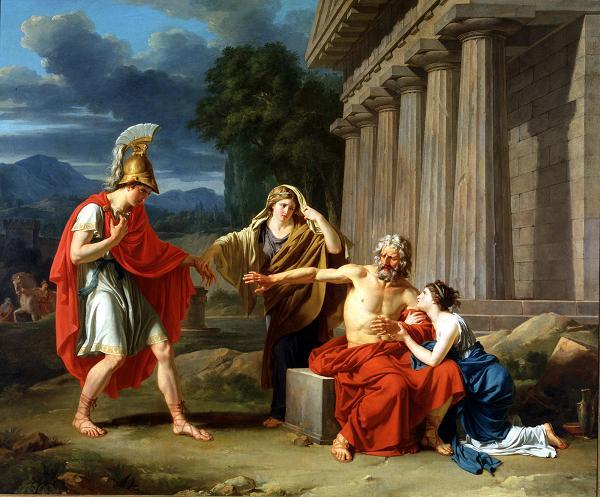
Source: Giroust - Oedipus At Colonus, Jean-Antoine-Theodore Giroust,
Wikimedia
Both monologues and soliloquies are conventions of speech in the theater. One of the conventions of action is dramatic irony. In this section, you will see how dramatic irony works as a convention of action in a play.
In the play Oedipus Rex by Sophocles, the king (Oedipus) doesn’t realize his own actions that have brought a plague on his city. When he pledges to find the person who has caused this plague and have him banished, he does not realize that he is talking about himself. The oracle tells Oedipus that the plague will end when the murderer of Laius (Oedipus’s father) is killed or banished. Oedipus doesn’t know that Laius was his father. (It’s a long story, and we’re not going to fill in all the details right now.) Because he doesn't know, Oedipus swears to the people of Thebes that he will track down the murderer and avenge Laius’s death “as if he were my own father.”
Everyone in the audience knows that Laius is, in fact, Oedipus’s father and that Oedipus killed him (don’t ask why he doesn’t remember this—if you read the play, it is believable that he wouldn’t remember). The audience is thinking, “Oedipus, you are swearing that you will banish or kill yourself.” Oedipus, however, is unaware of the true meaning of what he is saying.
In other words, he doesn’t understand what he is saying, but the audience does. When the audience understands something a character does or says, but the character does not understand, this is dramatic irony.
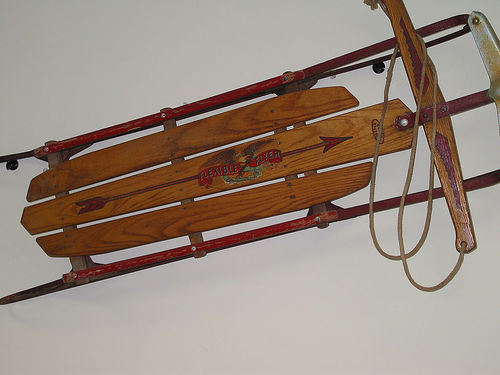
Source: Citizen Kane, 1941, jack Samuels
In the movie Citizen Kane, Charles Foster Kane spends his life becoming rich and powerful but does not become happy. At the end of his life, he realizes that happiness existed for him once, and as he dies, he looks at a snow globe of a winter cabin and says the name “Rosebud.”
We know from a flashback that Kane’s life started in Colorado where he lived as a child. A scene shows him playing in the snow as his mother receives word that gold has been discovered on the land that she owns. The gold mine will make Kane immensely wealthy.
So what is Rosebud? That is the mystery of the movie. A reporter spends the entire film interviewing people who knew Kane, asking them if they can tell him anything about Rosebud. Rosebud is the secret of Kane’s life.
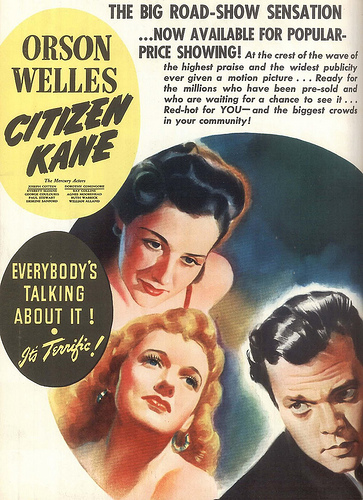
Source: Rosebud, fixedgear, Flickr
In the final scene of the film, some workers are cleaning up the mountains of possessions accumulated by Kane over his life and throwing away things that seem worthless. One of the things they throw into a huge fire is a sled, and we see, as the flames blister the varnish on the sled, that it has a name: Rosebud.
The workers who are cleaning up think the sled means nothing; they throw it out. To the audience, the sled holds the secret to Kane’s life. It represents the one time in his life that he was happy.
See if you can choose the best summary statement of why this is an example of dramatic irony.

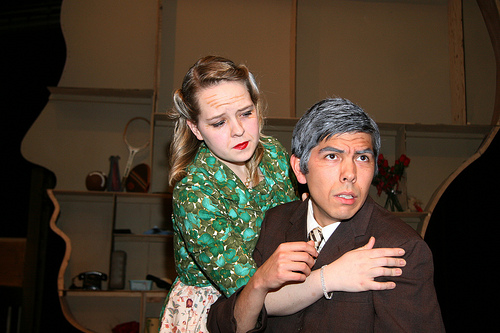
Source: Death of a Salesman #4, Thompson Rivers University, Flickr
Dramatic irony always has some reversal or opposition of expectations. For example, suppose the audience knows that a letter just delivered to a character onstage has the money the character needs to save his business from ruin, but the character onstage says he can’t take time to open the letter because he has to figure out how to save his company. He says, “I’ll deal with that later” and throws the envelope aside. Time passes, he doesn’t find any way to raise the money, and the play ends with the business ruined, too late to save. The man sits on a couch alone. He notices the envelope and reaches for it. The curtain closes. That’s a dramatically ironic ending.
The envelope meant nothing to the man, but to the audience, it meant everything: the man’s salvation.
It’s worth noting that people don’t experience dramatic irony in their day-to-day lives. It is exclusively a theater convention. In our daily lives, we may find examples of situational irony, but not dramatic irony.
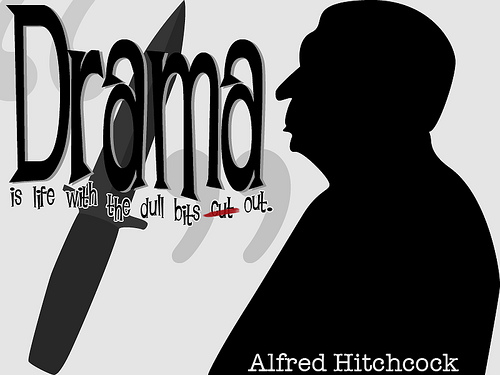
Source: Hitchcock, Nathan Wells, Flickr
Now you will study a theatrical situation with a dramatically ironic reversal of understanding. An episode of Alfred Hitchcock Presents based on a story by Roald Dahl involves the hiding of a murder weapon. How could this be ironic? Before you watch the video, choose one or more of the ways below that could be ironic. This is not a quiz question but is a chance for you to test your “ironic aptitude.”
The hiding of the murder weapon will be ironic because
- the policemen looking for it will actually be helping to hide it;
- the policemen looking for it will ignore it as unimportant; or
- the policemen looking for it will discount it as impossible to use as a weapon.
Here’s another clue: The murder weapon is a frozen leg of lamb. Now what do you think? How could hiding the frozen leg of lamb turn out to be ironic?
Watch “Lamb to the Slaughter” and answer the questions. You need to know that the wife has hit her husband over the head with a frozen leg of lamb and killed him.
Source: “Lamb to the Slaughter”, Lockner (Teacher) Sullivan North High School, SchoolTube


Source: Lifehouse "Everything" Drama, Faith Church St. Louis, Flickr
Dramatic irony can be tricky to identify. To get straight on dramatic irony, you need to think about the difference between what the audience understands and what the character understands. You need to look for a reversal or opposition of expectations in the way the audience understands something in contrast to the way a character understands the same thing.
Usually dramatic irony will make the audience want to say, “You don’t know what you’re saying” or “You don’t understand what you’re doing.” In other words, dramatic irony makes the audience want to tell the character, “Don’t do that” or “Don’t say that.”
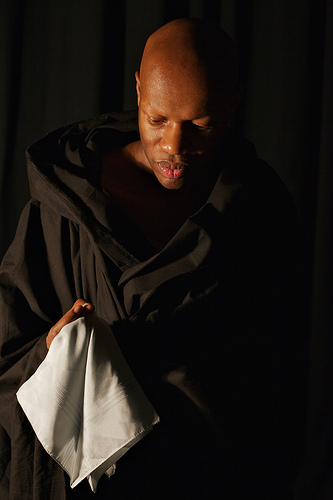
Source: 2010-othello_MG_0224, Hen3k Hen3k,
Flickr
In the case of “Lamb to the Slaughter,” most people would want to say to the inspector, “You’re so clueless, but please, don’t figure it out.”
In all three of the dramatic conventions you have studied, the audience knows how the convention functions and why it is different from the way things work in real life.
- The audience knows a character delivering a monologue is talking at great length so the author of the play can present background material or information about the character who is speaking.
- The audience knows that a character delivering a soliloquy is saying what he or she is thinking even though it is said aloud. The audience knows what the character is saying reflects the true thoughts of the character.
- The audience knows dramatic irony contrasts their understanding to the understanding of the characters. The audience knows that the statements and actions of the characters are intended to emphasize the characters’ lack of knowledge about something.
In the final section, you will be asked to read a short skit to identify the function of all three conventions you have read about in this lesson.